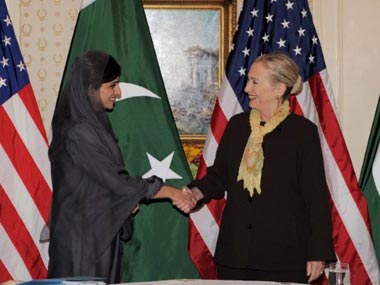New York: The Americans are very publicly accusing Pakistan of stunning duplicity in the war on terror. Stung by a warning issued by US officials to Pakistan to cut ties to the Taliban-affiliated Haqqani network, Islamabad first railed against America saying it risked losing an ally. Then it attempted to deflect attention from itself by raising the Kashmir issue. The White House on Friday reiterated its call for Pakistan to cut its ties to the Haqqani network and shut down safe havens on the Afghanistan-Pakistan border. There are no signs that Pakistan is taking the warning seriously. Instead, Islamabad absorbed the impact of a resounding slap to the face by subtly threatening to stop protecting US and Nato supply lines to Afghanistan. US-Pakistan hostilities didn’t prevent Pakistani Foreign Minister Hina Rabbani Khar from looking for more conflict. She attacked New Delhi over alleged human rights abuses by Indian security forces in Kashmir. [caption id=“attachment_91551” align=“alignleft” width=“380” caption=“US-Pakistan hostilities didn’t prevent Pakistani Foreign Minister Hina Rabbani Khar from looking for more conflict.AFP Photo”]  [/caption] “The rape of a young woman at the hands of security forces in Kulgam a few weeks ago and custodial killing of trader Abdul Rashid in Sopore are recurring cases of human rights violations in India-occupied Kashmir,” Khar told the Organisation of Islamic Conference (OIC) in New York. Khar also said Pakistan was convinced “the key to enduring peace, security and stability in South Asia lies in resolving the Kashmir dispute.” If India was irritated, External Affairs Minister SM Krishna masked it well. Butter wouldn’t melt in his mouth as Krishna exchanged a few words with Khar at the Saarc foreign ministers’ meeting on the sidelines of the UN General Assembly. Indian officials said President Obama must “put pressure” on Pakistan to cut ties will Islamic terrorists. It should please New Delhi that there is new determination growing in the US government to force Pakistan into changing its ways. In a dramatic appearance before the Senate Armed Services Committee, Admiral Mike Mullen, chairman of the Joint Chiefs of Staff, accused Pakistan’s spy agency, Inter-Services Intelligence (ISI), of supporting Haqqani militants with a 22-hour assault on the US embassy in Afghanistan and engineering a truck bomb assault this month on a US combat outpost in Kabul’s Wardak province that wounded 77 US soldiers. “The Haqqani network, for one, acts as a veritable arm of Pakistan’s ISI agency. With ISI support, Haqqani operatives planned and conducted that truck bomb attack, as well as the assault on our embassy,” said Mullen, making the accusation publicly, with specific information attached to it. The Senate Appropriations Committee also voted earlier Wednesday to make $1 billion worth of aid to Pakistan conditional on action against militant groups, such as the Haqqani network. Stalked by recession, Americans are not enthusiastic about billions of tax dollars being lavished on a “basket-case”. “The President can’t get Bank of America to use taxpayers’ money wisely, how will he deal with Pakistan’s slippery generals?” quipped American primary school teacher Belinda Harris. The US media has also been gunning for Islamabad. “With an ally like Pakistan, who needs enemies?” said The Los Angeles Times. With tongue firmly in cheek, it observed: “It’s not as if the Pakistanis haven’t helped us. After all, didn’t they keep Osama bin Laden cooped up in a compound near their major military academy for years, just waiting for us to come and get him?” US broadcaster Voice of America said Pakistan shouldn’t expect a blank cheque forever; “With America facing major economic difficulties and its relationship with Pakistan severely frayed, the future of such aid appears to be very much in question.”
With the US taking a tough line on Pak support for the Haqqani terror network, Pakistan’s foreign minister is trying to divert attention to the situation in Kashmir.
Advertisement
End of Article


)
)
)
)
)
)
)
)
)



